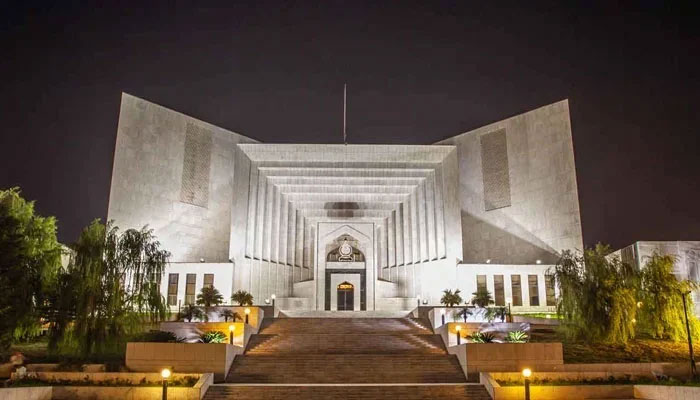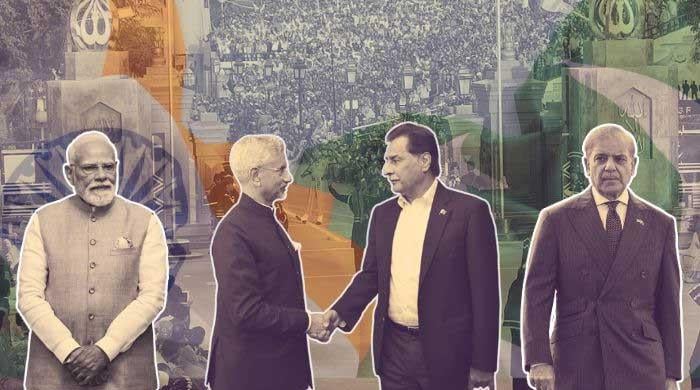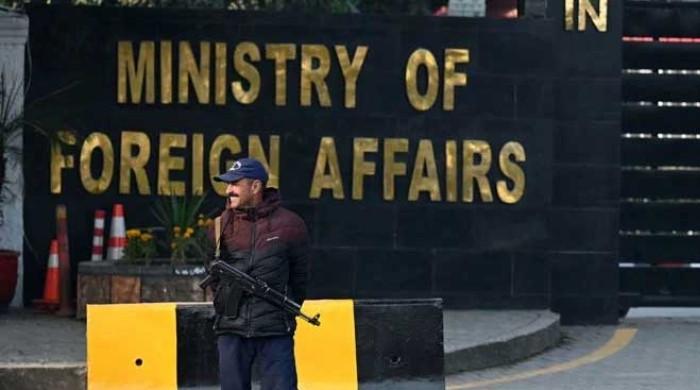In boost to Nawaz and Tareen, Supreme Court ends lifetime disqualification
SC issues ruling with 6-1 majority; disqualification under Article 62(1)(f) capped at 5 years; Justice Afridi differs with fellow judges
January 08, 2024

- Top court issues ruling with 6-1 majority as Justice Afridi dissents.
- Disqualification under Article 62(1)(f) now capped at five years.
- Political analysts and experts welcome Supreme Court's decision.
ISLAMABAD: After much deliberation, the Supreme Court of Pakistan Monday ended the lifetime disqualification of lawmakers, recalling its earlier order of disbarring politicians from running for office ever, boosting hopes for political bigwigs who are eyeing to contest polls on February 8.
The Supreme Court declared that no person can be barred for a lifetime from running in elections if they are disqualified under Article 62 (1)(f), setting aside its landmark judgment in the Samiullah Baloch case.
A seven-member larger bench — headed by CJP Qazi Faez Isa and comprising Justice Syed Mansoor Ali Shah, Justice Yahya Afridi, Justice Aminuddin Khan, Justice Jamal Khan Mandokhail, Justice Muhammad Ali Mazhar, and Justice Musarrat Hilali — conducted the hearings of the case, which were broadcast live on the apex court’s website.
The bench announced the verdict with a 6-1 majority as Justice Yahya Afridi disagreed with his fellow judges, backing the apex court's previous judgment.
The legal conundrum arose after the parliament passed the amendments in the Elections Act 2017, restricting the disqualification period of a politician to five years, instead of a lifetime, contrary to the SC’s order, which deemed disqualification under Article 62(1)(f) as “permanent”.
The latest judgment finally allows Pakistan Muslim League-Nawaz (PML-N) supremo Nawaz Sharif and Istehkam-e-Pakistan Party (IPP) chief Jahangir Tareen to run for office as they were disqualified for life.
While announcing the reserved verdict, the chief justice noted that since the election schedule was issued, it was “necessary” to release the order at the earliest.
In the previous hearing, the chief justice remarked that disqualifying anyone from life from parliament was "against Islam" as he quoted a verse from Surah Sajdah which explains that human beings are not bad but their deeds are.
While talking to Geo News, senior anchorperson Shahzeb Khanzada and Pakistan Institute of Legislative Development and Transparency (Pildat) President Ahmed Bilal Mehboob said that the order “came at the right time”.
In the written order, the SC noted that Article 62(1)(f) of the Constitution is not a self-executory provision as it does not by itself specify any period for disqualification.
“There is no law that provides for the procedure, process, and the identification of the court of law for making the declaration mentioned in Article 62(1)(f) of the Constitution and the duration of such a declaration, for the purpose of disqualification thereunder, to meet the requirements of the Fundamental Right to a fair trial and due process guaranteed by Article 10A of the Constitution.”
The interpretation of Article 62(1)(f) of the Constitution in imposing a lifetime disqualification upon a person through an implied declaration of a court of civil jurisdiction while adjudicating upon some civil rights and obligations of the parties is beyond the scope of the said Article and amounts to reading into the Constitution, the order noted.
Such reading into the Constitution, the order mentioned, is also against the principle of harmonious interpretation of the provisions of the Constitution as it abridges the fundamental right of citizens to contest elections and vote for a candidate of their choice enshrined in the Constitution, in the absence of reasonable restrictions imposed by law.
“Until a law is enacted to make its provisions executory, Article 62(1)(f) of the Constitution stands on a similar footing as Article 62(1)(d), (e), and (g), and serves as a guideline for the voters in exercising their right to vote,” the order read.
“The view taken in Samiullah Baloch case, treating the declaration made by a court of civil jurisdiction regarding breach of certain civil rights and obligations as a declaration mentioned in Article 62(1)(f) of the Constitution and making such declaration to have a lifelong disqualifying effect amounts to reading into the Constitution and is therefore overruled.”
The order added that since Section 232(2) added in the Elections Act, 2017, on June 26, 2023, prescribes a period of five years for the disqualification incurred by any judgment, order, or decree in terms of Article 62(1)(f) of the Constitution, there “remains no need to examine its validity and scope in the present case”.
However, Justice Afridi said he disagrees with his colleagues as the extent of a lack of qualification of a member of the parliament, as envisaged under Article 62(1)(f) is neither lifelong nor permanent, and the same shall remain effective only during the period the declaration so made by a court of law remains in force.
“Therefore, the conclusion so drawn by this Court in Sami Ullah Baloch Versus Abdul Karim Nousherwani (PLD 2018 SC 405) is legally valid, hence affirmed,” the Supreme Court’s judge added.









